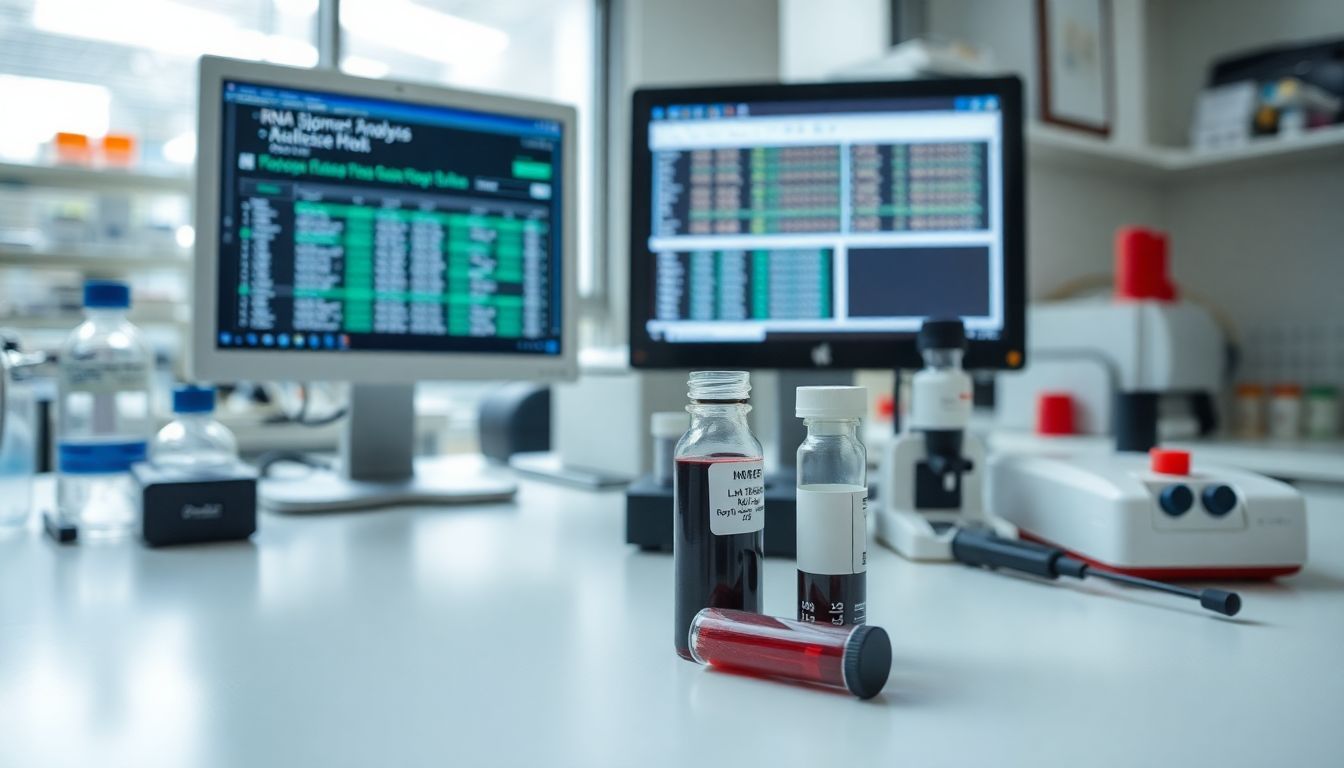Many people struggle with stress, anxiety disorders, or depression. Scientists are now exploring if blood tests could predict the risk of these mental health conditions. This blog will explain how new research and biomarkers might help spot problems early.
Thank you for reading this post, don't forget to subscribe!Keep reading to learn more about this exciting possibility!
Key Takeaways
- Scientists are studying RNA biomarkers in blood to predict mental health risks like anxiety, depression, and stress-related disorders. Dr. Alexander Niculescu from Indiana University leads key research in this area.
- Blood tests might help identify mental health problems early, enabling timely treatments like therapy or non-addictive medications before symptoms worsen.
- Research is experimental and not yet ready for regular use. More studies are needed to confirm the accuracy of these tools for conditions like PTSD or severe anxiety.
- Ethical concerns include data privacy and potential stigma if people learn they’re at risk for mental health issues based on biomarker testing results.
- Mental health disorders can lead to serious outcomes if untreated, such as physical illness or hospitalization. Early detection could improve lives by reducing suffering and enhancing care options through precision medicine methods.
Potential of Blood Tests in Predicting Mental Health Risks

Blood tests may help spot signs of mental health issues like anxiety or depression before they show up. Researchers are studying RNA biomarkers to understand risks and improve early treatment.
Emerging research on biological markers
Studies suggest that biological markers in the blood may predict mental health problems. Researchers like Alexander Niculescu from Indiana University School of Medicine are exploring this field.
They focus on RNA biomarkers linked to anxiety, depression, and stress-related disorders. These markers could reveal risks before symptoms appear.
MindX Sciences is testing tools for identifying mental health issues early through these findings. Such advances aim to support precision medicine approaches. Experts hope this will lead to personalized treatments for conditions like major depressive disorder, bipolar disorder, or post-traumatic stress disorder.
Importance of early intervention
Identifying anxiety biomarkers early opens the door to life-changing prevention. Blood tests for anxiety risk could inform mental health evaluations before symptoms escalate. This approach may reduce suffering and prevent severe outcomes, like psychiatric hospitalization or psychotic symptoms.
Early detection allows quick access to anxiety treatment options, such as cognitive behavioral therapy or non-addictive medications. Health professionals can guide lifestyle changes, targeting factors like hormonal changes linked to mood disorders or physical conditions like obesity and heart disease.
Acting sooner supports better overall mental health and lowers long-term risks of more serious psychiatric disorders.
Experimental stage of blood tests
Blood tests for predicting mental health risks, like anxiety or depression, are still being studied. Researchers are exploring RNA biomarkers to identify these conditions early. This effort could make risk prediction faster and easier in the future.
The work remains experimental and not yet ready for widespread use.
Dr. Alexander Niculescu at Indiana University School of Medicine is a leading name in this field. His team links blood biomarkers with anxiety severity, PTSD, and other mental disorders.
These promising findings point to a new way of addressing psychiatric symptoms through precision medicine—though more research is needed before it becomes part of routine health screening.
Validating the Effectiveness of Blood Tests
Blood tests for mental health risks are still in early stages. Scientists need more proof to confirm their accuracy and usefulness.
Need for further research
More studies are needed to prove if blood biomarkers can reliably predict mental health conditions. Current research, like work by Alexander Niculescu at Indiana University School of Medicine, shows promise but remains in experimental stages.
Factors like hormonal changes and the complexity of anxiety disorders make it harder to find clear-cut answers.
Testing must also address accuracy for predicting risks such as severe anxiety or post-traumatic stress disorder. Ethical concerns arise about using sensitive data from tests like RNA biomarkers or cholesterol levels (HDL-C and LDL-C).
Without thorough evidence, these tools may not yet be fit for real-world mental health evaluations.
Science needs time to ensure solutions actually help, says experts in molecular psychiatry.
Complexity of mental health
Mental health stems from many factors. Genetics, environment, and daily stress all play a role. For example, events like a traumatic event or hormonal changes can trigger anxiety disorders or depressive disorders.
The Diagnostic and Statistical Manual of Mental Disorders shows how mental health conditions overlap with other issues, such as heart attack risks or chronic diseases. These links make predicting mental health challenges tricky.
Conditions like schizoaffective disorder or post-traumatic stress disorder vary widely among people. Brain functions differ due to RNA biomarkers or other biological markers found in studies by places like the Indiana University School of Medicine.
Even lifestyle choices—like diet and exercise—can impact symptoms such as panic attacks or depression severity. All these layers show why diagnosing and treating mental health takes precision medicine combined with tools like comprehensive mental health reports for accuracy.
Ethical considerations
The link between blood tests and anxiety risks raises serious questions. Privacy is a top concern. Sharing genetic or RNA biomarker data could lead to misuse or breach of confidentiality.
Patients might also face stigma if labeled at risk for depression, anxiety disorders, or panic attacks.
Risk assessment results can impact mental health too. Learning about a high chance of post-traumatic stress disorder (PTSD) may increase stress instead of helping. Before these tests become common, safeguards must protect personal information and ensure ethical use in precision medicine research.
Public Health Relevance
Mental health problems like anxiety and depression can deeply affect communities, making early detection tools more important than ever. Keep reading to learn how science may help predict risks before symptoms appear.
Impact of mental health issues
Mental health disorders affect millions of people worldwide. Anxiety disorders, depression, and psychotic issues can lead to severe outcomes like psychiatric hospitalization or even suicide.
These conditions often come with anxiety-related physical symptoms, such as headaches or high blood pressure. Mental health problems also increase the risk of comorbidities like cardiometabolic diseases and hyperlipidemia.
Such challenges place a heavy burden on public health systems.
Early identification is crucial for better outcomes in mental health care. Untreated conditions can escalate into panic attacks, hallucinations, delusions, or other anxiety states over time.
Effective treatments include cognitive behavioral therapy, lifestyle changes like relaxation techniques, and non-addictive medications targeting RNA biomarkers or hormonal changes linked to stress and mood shifts.
Early intervention could reduce anxiety severity and improve well-being for many individuals… Next up: exploring how blood tests might help predict these risks early!
Conclusion
Blood tests might change how we understand mental health. They could help spot risks for stress, anxiety, or depression early on. While still experimental, this research shows promise for future treatments and prevention methods.
With more study and care, these tests may soon offer new ways to improve well-being. The potential is exciting—and worth watching closely!
